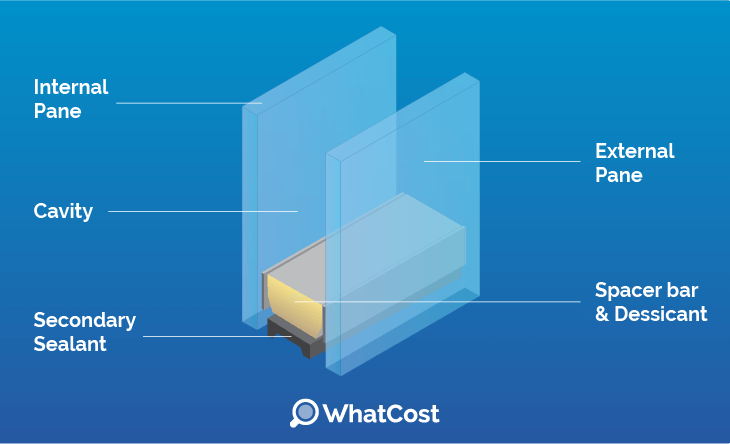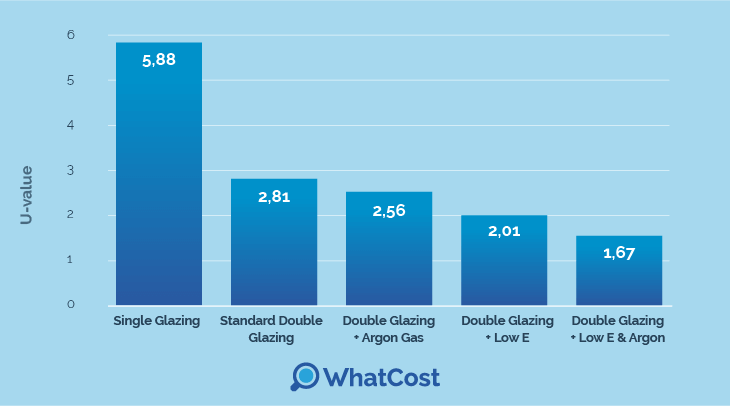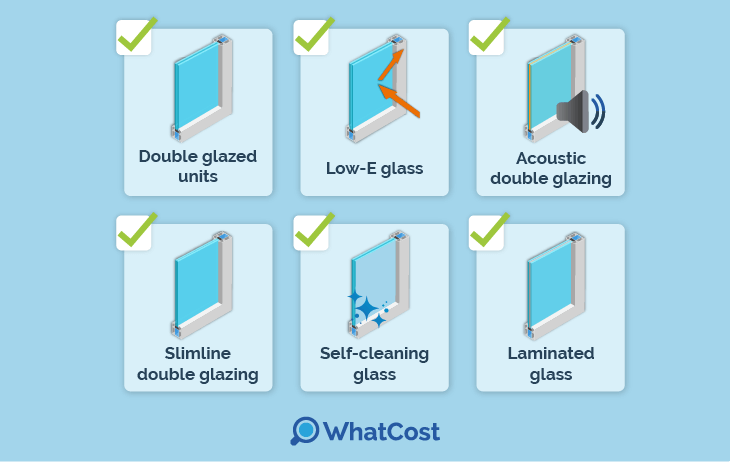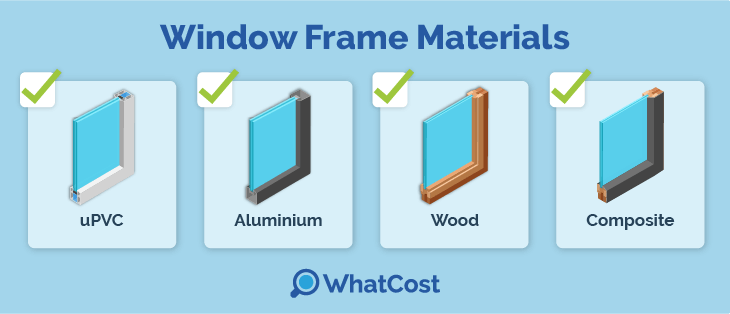Answer these simple questions and we will find you the BEST prices
Which type of solar quotes do you need?
It only takes 30 seconds
100% free with no obligation

Get up to 4 quotes by filling in only 1 quick form

Compare quotes and find yourself the best deal

Increase the value of your home by installing new windows
- whatcost.co.uk
- Windows
- Double Glazing Windows
Double Glazing Windows in the UK: A Complete Guide (2025)


- Double glazing refers to a type of window that uses 2 panes with an insulating gas in between for increased thermal performance.
- Types of double glazing include low-emissivity glass, toned glass, and laminated glass windows.
- The biggest benefit of double glazing is that it provides better insulation at very low installation and purchase costs.
Double glazed windows have become the standard type of glazing in the UK, as they provide better heat insulation and decent energy savings. While some homes in the UK are still single-glazed, many grants and government schemes can help upgrade them to double glazing. It’s a great time to get these thermally efficient windows in the UK.
Let’s see what double glazing has to offer, what various types are available, and whether they are worth it for your home.
That said, regardless of the type of window you want to install, you will need a trustworthy professional who can offer you the best prices. Finding one on your own can take hours of research, which is why our service can be a better alternative. Fill out a short 30-second form, and we’ll get back to you with up to 4 free, non-binding window quotes from reliable installers.
We’ve vetted the installers in our network ourselves, ensuring the best prices and service. Click the button below to get started.
- Quotes from local installers
- Payment by finance available
- Save up to £150 per year
It only takes 30 seconds

What is double glazing?

Double glazed or double paned windows have two panes of glass contained in one frame. Double glazing is the most common style of window glazing in the UK nowadays and can be adapted to any window design. The most common form of double glazing uses argon or another gas in between the two panes of glass to help improve insulation.
With the use of more than one layer, windows can retain heat within the home in the winter, and keep out heat that may enter the home summer. Better insulation makes the home more comfortable and saves on heating expenditure by preventing heat loss. Window double glazing also helps prevent noise transmission.
The cost of double glazing a 2 bed house will be £1,800 to £8,775 while the cost of double glazing a 3 bed house be between £4,000 and £16,500. On the higher end, the cost of double glazing a 4 bed house or larger property will start at £6,000. These prices vary based on the quality, size, materials, and glazing of the windows (among other factors).
How do double glazed windows work?
Double glazed windows use 2 panes of glass and often have a gas for insulation. The purpose of this design is to slow down heat transfer between two zones with different temperatures. This can allow windows to reduce heat loss during the winter and inhibit heat entry in the summer.
The glass allows solar radiation shortwaves to pass through while keeping longwaves out. In effect, the thermal energy of the infrared radiation from the sun is trapped thanks to the glass and will be unable to pass through. It essentially diminishes the amount of heat getting in or out, decreasing heating costs for the household.
Certain types of glass can boost this process. For example, Low-E glass uses a microscopic magnetron coating to reflect the shortwave radiation and push it away from the outer layer of the glass, making it a great choice for external, sun-facing windows.

U-values indicate how much energy passes through a window, calculated as Watt /metre2 in Kelvin or degrees centigrade. This means that the lower the u-value, the less energy is lost per square metre. As the graph shows, combined with an effective insulation gas, Low-E glass can be a great insulator.
And what are double glazed windows going to save you in terms of home heating? Annual savings compared to single glazing can be between £140 to £150, according to the Energy Savings Trust. Over the course of 20 years, this can stack up, being between £2,400 to £2,800 in savings.
Types of double glazed windows

- Double glazed units: Standard double glazed units have two panes with a desiccant in between. These are the most common, along with Low-E glass.
- Low-E glass: Low-emittance glass contains a microscopically thin, transparent coating that reflects heat. This can be paired with different desiccants to increase efficiency.
- Acoustic double glazing: This form of double glazing uses materials that minimise noise transmission. It can be ideal for homes that are in noisy areas.
- Slimline double glazing: Slimline double glazing is far thinner as the name implies, often being 4mm per layer (8mm to 12mm in total). These can be great for double glazing older windows or in conservation areas where the frames were designed for single glazing.
- Self-cleaning glass: A special kind of glass that has a coating that can clean the window using sunlight. It’s a great option for windows that may not be easily accessible.
- Laminated glass: Laminated glass is a high-strength glass which is up to 5 times stronger. It utilises a plastic interlayer made from EVA (ethylene-vinyl acetate) or PVB (polyvinyl butyral), and is created with the help of pressure rollers.
Double glazing materials
Double glazing primarily consists of glass and insulation but materials can vary based on the type of glazing used and the frame materials (usually uPVC, wood, or aluminium). Glazing can utilise tempered glass, laminate, and plastics as window pane materials, among other types of transparent materials.
Materials include:
- Glass: The most commonly used material for windows is plain glass, as one might expect. This is generally not thermally efficient, which is why double glazing can be a better option than a single pane. Different types of glass include float glass, low-e glass, and laminated glass, all of which have different thermal properties.
- Acrylic: Poly(methyl methacrylate) is a plastic material that can be substituted for glass, which can allow for higher impact-resistance windows. It can also be 50% lighter and a fair bit clearer, depending on how it is developed.
- Polycarbonate or polyethylene: Plastic alternatives like polycarbonate are more powerful than many forms of glass, which is why they are used in engineering to produce transparent parts.
Window frame materials can also vary, with the most common ones being:

- uPVC: Unplasticised Polyvinyl is a sustainable material that provides reasonable thermal efficiency. It doesn’t last as long as most materials (roughly 20 years on average), but it doesn’t require any maintenance or cleaning. uPVC windows are an effective, low-cost option, but they can appear cheap aesthetically.
- Aluminium: For thin frames that maximise glazing space, aluminium can be the best material. Offering a very modern design with a naturally metallic finish, it can be a great option for thin yet strong frames. Aluminium windows cost more than uPVC but can be a good mid-price option, especially when compared to timber windows.
- Wood: Timber is a great material to create windows, offering frames that last literally over a lifetime if maintained properly. While they require the occasional polishing, they can be worth it for the noise reduction, limitless recyclability, and thermal properties. Wooden windows are generally the most expensive option, but they can be worth it for the extended savings they provide.
- Composite: Composite windows can mix and match multiple materials and get the best of their properties. They can be made from fibreglass, aluminium, and wood, blended together in different proportions.
To get the best advice on what type of window material will be best for you, we recommend consulting an expert. However, you need to find a reliable one who will give you the best prices and advice. This can lead to hours of research that you may not have. That’s why our service narrows this down to a 30-second form that can provide you with up to 4 free, non-binding quotes from reputable installers in your area.
Let us take the wheel while you receive the best prices from installers we’ve personally vetted. Click the button below to get started.
- Quotes from local installers
- Payment by finance available
- Save up to £150 per year
It only takes 30 seconds

Advantages of double glazing
- Efficient: Double glazed windows can help save between £2,400 to £2,800 over the course of a 25-year lifespan.
- Grants available: Various government incentives like the ECO4 scheme can help upgrade single glazing to double glazing. They can either cover the double glazing cost entirely or at least partially.
- Better security: The additional glass provides better protection against damage, while also being sturdier and solid.
- Fairly affordable: While single glazed windows are the cheapest option, double glazing has become very affordable in recent years. They are also cheaper compared to triple glazed windows costs, while providing sufficient savings for the average home.
- Many different options: There are many styles and materials available for double glazing. This can help these windows fit into any type of home.
Disadvantages of double glazing
- Not the highest efficieny: Triple glazed windows can be more efficient for keeping in heat and saving costs (although this may not be suitable for homes with a moderate climate).
- Not fit for all homes: Double glazing may not be allowed in protected areas where windows cannot be changed. However, it is possible that you can install slimline double glazed windows or secondary glazing in such homes with permission.
- Need for gas replacement: Unlike single glazing, double glazed windows require replacing the gas if it leaks out.
Should you get double glazing for your home?
Double glazed windows are affordable, versatile in terms of design, and very accessible for most homeowners. They provide savings in the long run and keep the home comfy and warm. There are also multiple double glazing grants that can help pay for double glazing in the UK if your home’s windows have single glazing or bad insulation.
What type of double glazing one gets can vary based on where their home is located and what one needs. You should examine the u-values of the glazing and see if they match your home’s heating output. There are different solutions for every home, so it’s best to talk to a professional regarding your particular situation
If you’re looking to install a double glazed window, there are many installers all over the UK. A reliable installer can make your investment worthwhile and ensure long-lasting windows and frames. However, finding one can be a difficult task, requiring hours of research. If you want to make certain you get the right one for the job, try out our service.
You can receive up to 4 free, non-binding quotes from the best installers in your area. Click the button below, fill out a 30-second form, and we’ll do the rest.
- Quotes from local installers
- Payment by finance available
- Save up to £150 per year
It only takes 30 seconds

FAQ
Double glazing is worth it for the vast majority of homes. Aside from providing energy savings, they are more secure and reduce noise, along with many other benefits.
The most effective double glazing is low emissivity glass. There are numerous other types of double glazed windows that can also be effective but low-e glass provides the best savings.
The best time to buy windows is winter when companies are in the off-season, but the best time to install new windows is spring, which can offer seasonal sales. The best deals can also vary by area and installer.
You can tell whether window double glazing is of good quality by checking its u-value, which indicates how much energy is lost through the window. Types of materials used can also indicate quality.
Double glazing lasts 20 to 25 years on average, with most companies offering warranties of 7 to 10 years. The lifespan can also vary depending on the materials used for glazing.

Rawal is an ex-tech journalist with a passion for sustainable innovations, green policies, and their adoption. With a straightforward writing style meant to be easily digested but full of handy tips, they are geared towards readers of all levels of familiarity with the technologies and home appliances covered.
